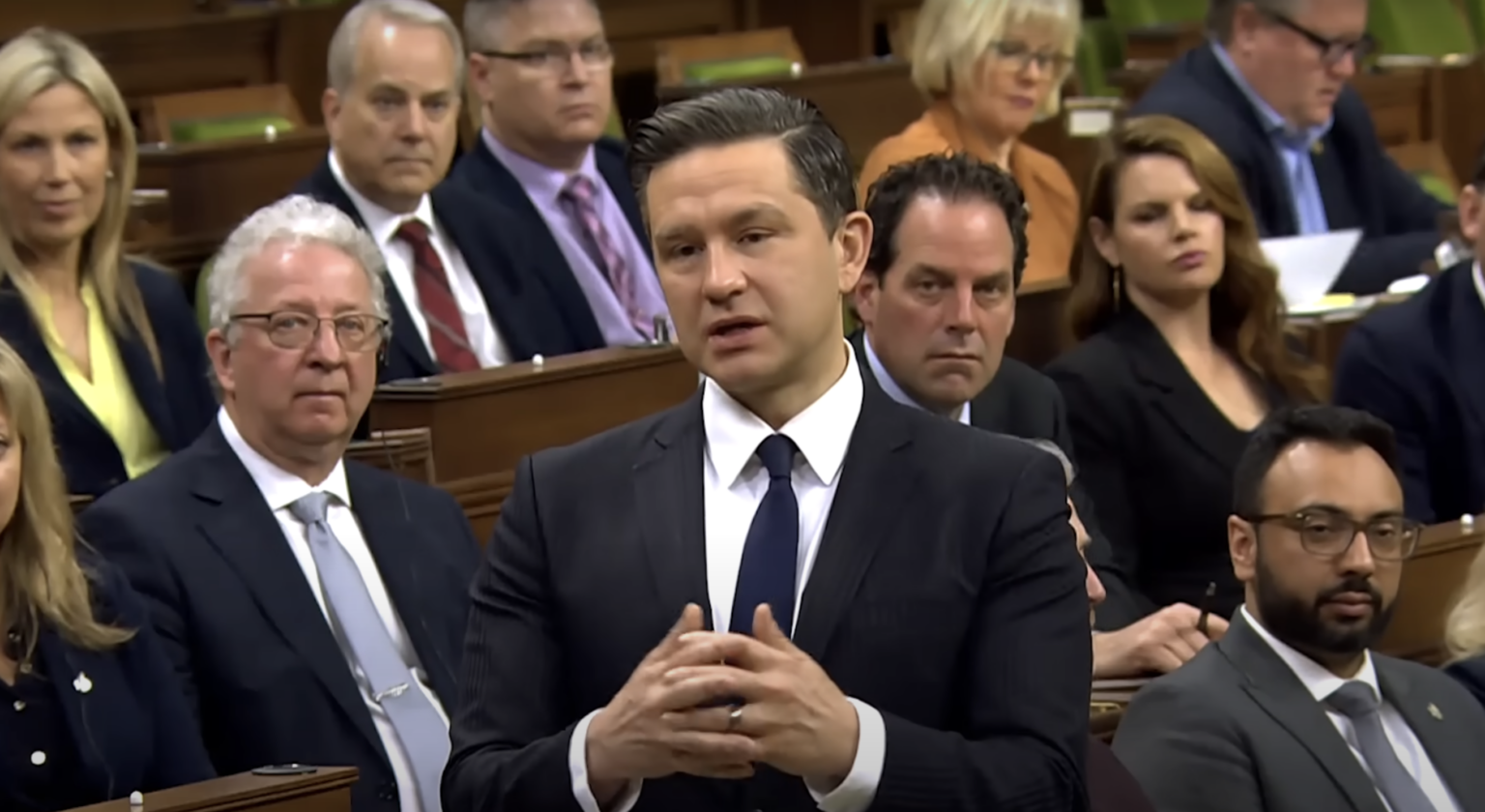Federal Conservative leader Pierre Poilievre has voted against the environment and climate nearly 400 times during his 20-year career as a Member of Parliament, according to House of Commons voting records analyzed by DeSmog.
That includes voting “nay” to bills crafted to hold mining companies accountable for environmental damage, move Canada closer towards achieving its climate targets, create high-quality jobs in low-carbon industries nationwide and align Canadian laws with the United Nations Declaration on the Rights of Indigenous Peoples, an international framework also known as UNDRIP.
Poilievre’s anti-environment record also includes voting “yea” for legislation designed to weaken environmental safeguards on new industrial projects and accelerate expansion of the oil and gas industry, Canada’s largest source of greenhouse gas emissions.
During his two decades in Parliament, Poilievre voted in favor of the environment and climate action just 13 times, DeSmog calculates based on a comprehensive list detailing every House of Commons vote he’s made as a federal politician.
“Those numbers say to me that he doesn’t believe we need to actually roll up our sleeves and work on climate change in a meaningful way,” said Bea Bruske, president of the Canadian Labour Congress, a national labour organization that’s been supporting ongoing federal legislation to foster climate-friendly union jobs.
“I’m very concerned about what a Pierre Poilievre government would look like,” she told DeSmog.
Poilievre’s office didn’t respond to questions from DeSmog about his environmental voting record. The Conservative leader, which some polls suggest is favoured by Canadians to be the next prime minister, stated earlier this year that as far as climate policy goes he’s in favour of “technology, not taxes,” without providing concrete details.
He is meanwhile enthusiastic about oil and gas expansion. “We’re going to clear the way for pipelines,” he has promised. “I am going to support pipelines south, north, east, west. We will build Canadian pipelines.”
A 20-year Voting Record
Poilievre was first elected as a Conservative MP in 2004. His first anti-environment vote took place that fall when he opposed a bill recognizing land claims of First Nations in the Northwest Territories in order to allow them more say over lands and water on their territories. The entire Conservative opposition also voted against it.
The following year he voted along with Conservative and Liberal MPs against legislation giving the province of Quebec greater resources and a mandate to implement the Kyoto climate accord.
After Conservative leader Stephen Harper became prime minister in 2006, and until Harper was voted out in 2015, Poilievre voted in lockstep with his party on a barrage of regulation-eviscerating bills, according to federal Green Party leader and MP Elizabeth May.
“Any chance that Pierre Poilievre had to vote against the environment, he always took it,” May told DeSmog.

That included his party’s passage of Bill C-38, an omnibus bill that May described at the time as “the Environmental Destruction Act.” That legislation, officially known as the “Jobs, Growth and Long-term Prosperity Act,” among other things repealed and replaced the Canadian Environmental Assessment Act, weakened national water protections, killed implementation requirements for the Kyoto Protocol and exempted oil and gas pipelines from the Navigational Waters Act.
More than 100 of Poilievre’s anti-environmental votes came from opposing amendments and challenges brought forward by May and other opposition MPs attempting to lessen the bill’s pollution and climate impacts, according to records reviewed by DeSmog.
That legislation was followed by Bill C-45, another Conservative omnibus bill that in its attacks on water protections and Indigenous sovereignty helped ignite a nationwide First Nations-led protest movement known as Idle No More.
Obstruction Under Trudeau
Following Liberal leader Justin Trudeau becoming prime minister in 2015, Poilievre has consistently voted, along with other Conservative MPs, against climate action and other environmental protection measures. That includes dozens of votes against the Liberal government’s carbon pricing initiatives.
During that period the federal Liberals have failed to put Canada on track to achieving climate targets agreed to at the 2015 Paris negotiations, however. A big reason for that is the party’s ongoing support for the oil and gas industry, including purchasing the $34 billion Trans Mountain oil sands pipeline and backing gas export projects such as LNG Canada, which climate experts say will tap a massive gas field in British Columbia and Alberta that represents the world’s sixth largest “carbon bomb.”
“There’s no indication Conservatives will do anything other than destroy climate policy,” May said. “But we don’t have a credible climate plan now from the Liberals.”
Poilievre cast a rare “yea” vote of climate action in 2017, voting alongside 277 MPs from all major political parties in favor of a motion stating that “despite the withdrawal of the United States from the Paris Agreement, Canada remain committed to the implementation of the Agreement, as it is in the best interest of all Canadians.”
Poilievre over the years has also voted in favor of legislation protecting whales and providing cleaner drinking water for First Nations communities.
But any positive votes he’s cast are more than offset by a 20-year legacy of privileging polluting and atmosphere-warming industries over the environment, May said. Poilievre this spring cast more than three dozen votes to stall and prevent the passage of Bill C-50, a bill the Canadian Labour Congress claims “will create new sustainable jobs, help shift energy workers into sustainable jobs, and decarbonize good jobs to make them sustainable.”
“We’re incredibly disappointed with the Conservative approach to delaying this act,” Bruske, the organization’s president, said. “Putting such obstacles in the road to passing legislation tells me the Conservatives actually have no interest in addressing climate change.”
Subscribe to our newsletter
Stay up to date with DeSmog news and alerts







